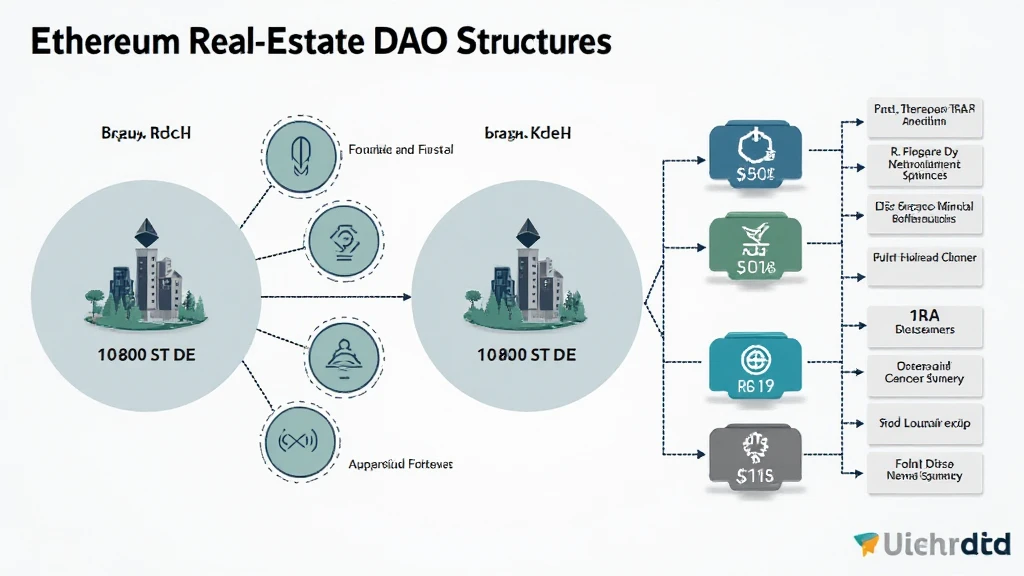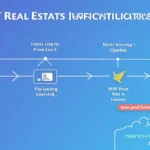Ethereum Real Estate DAO Structures: Revolutionizing Property Investments
In a world where technology ever-evolves, traditional industries are being redefined. The real estate sector is no exception. With an astounding $1.9 trillion in global real estate transactions in 2022, it’s clear that big changes are essential. One potent concept bringing innovation to this field is the use of decentralized autonomous organizations (DAOs) on the Ethereum blockchain. This article will thoroughly explore Ethereum real estate DAO structures, their implications, and how they can transform property investment.
The Rise of Ethereum and Its Impact on Real Estate
Ethereum has established itself as a leader in the blockchain space, with over 2 million active addresses reported in 2023. But why is this significant in real estate? The structure of Ethereum enables smart contracts, which automate and enforce agreements without intermediaries. This characteristic is central to the establishment of real estate DAOs.
What is a DAO?
A DAO, or decentralized autonomous organization, operates transparently through smart contracts on the blockchain. Members can participate in decision-making processes directly based on their ownership or stake in the organization. Unlike traditional organizations, DAOs lack a centralized authority.

- Transparency: All transactions are recorded on the blockchain, ensuring full visibility.
- Democratic Governance: Decisions are made collectively, mitigating power imbalances.
- Efficiency: Reduced costs through automation and elimination of intermediaries.
The Mechanics of Ethereum Real Estate DAOs
Ethereum real estate DAOs utilize the Ethereum blockchain to facilitate property investments. But how do they operate? Here’s a breakdown of a typical structure:
Ownership and Tokenization
Real estate properties can be tokenized, where each token represents a stake in the physical asset. Investors purchase these tokens to gain exposure without needing to buy an entire property. This democratizes access to investing in real estate.
Decentralized Governance
In a real estate DAO, governance is decentralized. Token holders can vote on critical matters like property purchases, sales, and management fees. The voting power usually corresponds to the number of tokens held, thus incentivizing long-term commitment from investors.
Case Studies: Successful Ethereum Real Estate DAOs
It’s one thing to talk about theoretical frameworks; real-world applications are another. Here are some noteworthy case studies of Ethereum-based DAOs in real estate:
RealT
RealT allows individuals to invest in fractional ownership of real estate properties. Investors receive a share of rental income, recorded on the blockchain. By 2023, RealT has registered over $60 million in property transactions, showcasing the market’s appetite for this approach.
Fractional
Another up-and-coming platform is Fractional, enabling users to hold fractional shares of high-value properties. Fractional has seen explosive growth, with projections indicating 120% increase in user bases in Vietnam alone over the next few years.
Benefits of Ethereum Real Estate DAOs
Utilizing Ethereum for real estate investment comes with numerous advantages:
- Liquidity: Tokenization allows quicker buying/selling of shares compared to traditional property investments.
- Accessibility: Lower entry barriers mean more individuals can invest in real estate.
- Diversification: Investors can spread their funds across multiple properties globally.
Challenges Facing Ethereum DAOs in Real Estate
While promising, Ethereum real estate DAOs face several hurdles:
Regulatory Uncertainty
Real estate transactions are heavily regulated, and blockchain’s decentralized nature can pose challenges. Various jurisdictions, including those in Vietnam, are still establishing frameworks on how DAOs fit within existing property laws.
Technical Barriers
Not every investor is tech-savvy. The complexity of blockchain and smart contracts may deter potential investors. Education on these technologies is vital for broader adoption.
The Future of Ethereum Real Estate DAOs
With forecasts suggesting that the decentralized finance (DeFi) sector will reach $800 billion by 2025, Ethereum real estate DAOs have immense potential for growth. They can revolutionize property ownership and investment, making it a more inclusive space.
Market Growth and Predictions
The real estate market in Vietnam is projected to grow by 17.3% between 2022 and 2027. Integrating DAOs into this burgeoning market can offer unprecedented opportunities for investors, making it a key player in the industry’s future.
Conclusion: Embracing Technology in Real Estate
In summary, Ethereum real estate DAO structures are poised to usher in a new era of property investment. By leveraging the capabilities of blockchain, these DAOs can make real estate investment more accessible, transparent, and efficient. While challenges remain, the potential for growth and transformation is undeniable.
As seen, the future is bright for Ethereum in the real estate space. The combination of innovative technology and a strong market demand can lead to unprecedented change in how we view property ownership and investment.
This article highlighted the fundamentals of Ethereum real estate DAO structures, their benefits and challenges. Stay informed and keep an eye on how this exciting convergence of technology and real estate evolves.
Note: Not financial advice. Always consult local regulations and professionals before investing.
Cryptotradershows is your go-to platform for insights into cryptocurrency, blockchain technology, and emerging trends!
Written by Dr. Jane Doe, a blockchain technology expert published in over 20 respected journals and a leader in smart contract auditing for well-known projects.




